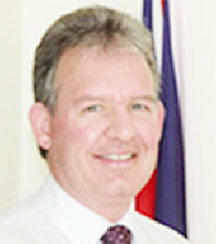UK High Commissioner to Guyana Andrew Ayre has called for President Donald Ramotar to reconvene the National Assembly as soon as possible stating that Parliament is the “central pillar of democracy.”
Ayre said, “The UK calls on the Government of Guyana, or the President more precisely of Guyana to reconvene Parliament at the earliest possible opportunity.
“Article 50 (of the Guyana Constitution), it clearly refers to democracy in Guyana being made up of the President, the Cabinet and parliament so it it’s important that we stay within the Constitution of Guyana going forward.”
He said that while the Constitution did give the President the power to prorogue Parliament, “it also gave in Article 106 part 6 the right for majority of MPs to dissolve the parliament essentially and have new elections.” He was responding to media questions in relation to the President’s decision to prorogue Parliament instead of face an opposition no-confidence motion. Ayre noted that that was an internal matter.

He acknowledged that discussions were held with Ramotar prior to and after the prorogation on November 10. When pressed for details Ayre’s stated, “What I say to the President and Cabinet it’s confidential but the central message is absolutely clear Parliament should re-sit in Guyana and get on with the business of taking this country forward.”
Ayre held firm that “this is a Guyanese problem it needs a Guyanese solution,” continuing that should all politicians reach a consensus that outside mediation is required the UK was prepared assist.
The High Commissioner cited the Charter of the Commonwealth and the central role Parliament plays in democracy.
According to the Charter, “Parlia-ments and representative local governments and other forms of local governance are essential elements in the exercise of democratic governance.”
The Charter states that separation of powers is fundamental. “We recognise the importance of maintaining the integrity of the roles of the Legislature, Executive and Judiciary. These are the guarantors in their respective spheres of the rule of law, the promotion and protection of fundamental human rights and adherence to good governance,” it states.
Ayre noted that Guyana as a member of the Commonwealth is bound by the principles of the Charter. Ayre was speaking yesterday at an event at the Bank of Guyana where the British High Commission in collaboration with the Government of Guyana is hosting an Anti-Money Laundering Training programme. He said that the prorogation will impact the passage of the amended anti-laundering legislation as no Parliament means no passage of any bills.
Ramotar’s prorogation of Parliament has triggered torrents of criticism from the opposition and civil society bodies. The President stated on Friday, mere hours before the opposition rally at the Square of the Revolution that he would be engaging the combined opposition.
Yesterday Leader of the Alliance for Change Khemraj Ramjattan stated that he has not received any calls from the President to engage in any meaningful dialogue, nor would he be accepting any such call. Ramjattan said his party was standing firm that there would be no talks until the prorogation ends.
“He hasn’t called me and I don’t expect him to…We have made it quite clear, there is nothing to talk about. End this prorogation,” Ramjattan stated. He said the President’s remarks on Friday were shallow. Ramjattan said that Ramotar would not end the prorogation within a reasonable time because he was trying to extend the life of his administration’s rule.
His sentiments and firm stance were mirrored by A Partnership for National Unity. APNU’s General Secretary Joseph Harmon told Stabroek News that the party was not contacted by the President to the best of his knowledge.
“The President has to call back Parliament before any talking can happen,” Harmon stated he continued that the government was not in its “right mind” to think that the suspension of the legislature was positive.
Since the Ramotar signed the proclamation proroguing the Parliament both opposition and government have met separately with the four Western missions and various civil society members on the way forward.
The President has stated that prorogation was the only way to create an atmosphere for dialogue with the opposition.
However, the opposition has warned of an impending dictatorship. Various political pundits and members of civil society have strongly condemned the President’s move calling it undemocratic.






